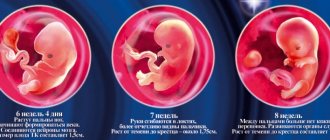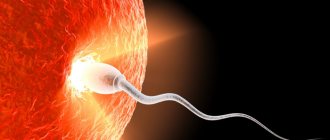Pregnancy is both a happy and one of the most exciting periods in the life of any woman. When the expectant mother learns that a new life is growing and developing inside her, she begins to look at this world in a new way. Even if the belly is not yet visible and the period is very short, she is already beginning to understand that she is responsible not only for herself, but also for her baby. On a subconscious level, she will feel that some changes are happening in her body, although the signs of pregnancy at 1 week are not very noticeable.
A baby begins and ends its development in the womb within 9 months. This is approximately 40 weeks, although the normal period is considered to be from 38 to 42 weeks. This period is divided into two periods: embryonic (eight weeks after conception) and fetal.
First week of obstetric period
The concept of the first obstetric week is very conditional. The calculation is carried out from the first day of the missed period, because this date is most often remembered by patients.
However, the exact day of conception is quite difficult to determine. Even if this is an established married couple who clearly remembers the date when they had unprotected intercourse, then conception itself may not have occurred on that day. Fertilization of the egg can occur on the third day after sexual intercourse.
Obstetric period is calculated from the last menstrual cycle. The embryonic period is the fertilization of the egg itself. Moreover, the first period is longer than the second by about two or three weeks. This is explained by the fact that a woman takes 14-18 days from the first days of her period to ovulation (at this time she becomes pregnant). It turns out that the first week of pregnancy according to the obstetric period is not such.
What changes occur in the mother's body in the first week of pregnancy?
In the first week, menstruation begins and ends. The bleeding surface of the uterus is healing. A follicle, a tiny sac containing an egg, begins to mature in a woman’s ovaries. This process is regulated by hormones produced in the ovaries and brain. Although other organs and tissues also indirectly influence the maturation of the egg: for example, the thyroid gland, adrenal glands, adipose tissue.
| Sometimes not one, but two or three eggs mature in a woman’s body. Subsequently, if they are all fertilized, a multiple pregnancy will occur, and fraternal twins, dissimilar to each other, will be born. The likelihood of such a development of events is higher in women whose families have already had twins or triplets. The chances of having twins also increase greatly after 35-39 years of age. |
With an ideal menstrual cycle, the follicle maturation phase lasts about 2 weeks. By the time of ovulation (rupture of its membranes), it will reach the size of an apricot kernel.
If you are tracking your ovulation using an ultrasound, it will confirm the growth of a dominant follicle this week. Based on the size of the bubble, the doctor will be able to predict the approximate date of release of the egg.
| For most women, ovulation and fertilization occur in the middle of the menstrual cycle. Therefore, 1 week of pregnancy after conception occurs at 3-4 weeks of the obstetric period. And at the moment when you discover a delay in menstruation, your pregnancy period, from the point of view of an obstetrician-gynecologist, will already be 4-5 weeks. |
Are there any changes in the body?
The first week of pregnancy is a period during which it is difficult to determine the exact symptoms that you are pregnant. There are certain sensations that are not much different from the manifestations of the usual PMS. But there are, although not obvious, indirect signs of pregnancy at 1 week.
After conception, a woman’s appetite increases almost immediately. At the same time, taste preferences can change dramatically: if previously you could not look at a certain type of product, now you can willingly consume them. Increased sensitivity to odors may begin.
One of the obvious symptoms of pregnancy at such an early stage is changes in the mammary glands. They swell, become visually larger in size and denser.
After conception, hormones literally “jump,” so excessive emotionality, unjustified aggression and irritability are also indirect signs. This can also include pigmentation on the skin and frequent urge to urinate.
Possible miscarriage
Studies have shown that miscarriage in the first week and missed abortion occur in 50-75% of all pregnancies, but for the most part go unnoticed.
According to the obstetric calendar, the first week of pregnancy occurs even before conception, which means that miscarriages do not occur during this week. A miscarriage can occur in the first weeks after conception, but the woman may not even realize she is pregnant. Usually, most women assume that their menstrual cycle is simply out of whack.
A miscarriage in the first week before a missed period is a failure in pregnancy, as a result of which the implantation of the embryo into the endometrium is disrupted at the end of the first week. Since the hormonal changes associated with pregnancy have not yet fully occurred in the body, menstruation begins on time or with some delay, perhaps only lasting longer and more abundantly than usual. Symptoms of pregnancy that could appear during this period are mistaken for premenstrual syndrome.
Why do miscarriages occur in the first week of pregnancy?
Almost always, genetic pathologies of the fetus are to blame for such an early miscarriage, as well as hormonal disorders (increase in male sex hormones) and diseases (toxoplasmosis, chlamydia, trichomoniasis) of the expectant mother herself. Therefore, there are no conditions for further development of the embryo. In addition, the cause may be severe nervous shock, abdominal trauma, consumption of large quantities of alcohol and caffeine, smoking, and drug use. Very often the true cause of a miscarriage remains unknown.
If there is a delay, in the first week a miscarriage may occur as painful and heavy menstruation. The embryo is rejected along with the mucous membrane of the uterine cavity, and a woman can know about her pregnancy if she measured her basal temperature or managed to do a test. During a miscarriage in the first weeks of pregnancy, the basal temperature suddenly drops to normal levels, which is one of the symptoms of its interruption.
If the signs and symptoms of pregnancy disappear, you may suspect that something went wrong. In this case, you need to conduct a urine test for hCG, which will make it possible to find out whether the pregnancy has been terminated.
When can I visit a gynecological office?
In the first week of pregnancy there may be no symptoms at all. At the same time, the body itself is already beginning to adapt to the embryo. Many women may suspect pregnancy due to certain sensations that appear only after a delay.
The expectant mother is registered only after confirmation of pregnancy (from about 2 months). At the same time, they are unlikely to tell you the exact date, because doctors rely on the last menstrual cycle.
If you want to understand before visiting a gynecologist whether you are pregnant or not, then there are a number of effective methods, which will be discussed below.
Signs of pregnancy in the first week

It is very difficult to talk about any specific signs at such a short stage of pregnancy. As a rule, a woman’s health state in the first week of pregnancy is practically no different from usual. Many women are not even able to independently determine that pregnancy has occurred, since they do not feel any changes in their body, and their well-being has not changed in any way. However, there are exceptions, and some pregnant women may already experience the following symptoms in the first week of pregnancy:
- Drowsiness.
- Mood swings.
- Weakness and fatigue.
- Nausea and stomach problems (constipation, flatulence).
- Lack of appetite.
- Light scarlet spotting from the vagina (one of the signs that the fertilized egg has settled in the uterine cavity).
- Decreased or increased blood pressure.
In addition, if before pregnancy a woman’s periods were very painful, then the period of menstruation during pregnancy can also be painful. But often, the first week of pregnancy has virtually no effect on the woman’s condition.
Basal temperature measurement
The first week of pregnancy can be determined not only by internal sensations. One of the main methods used at home is measuring basal temperature parameters. It should be noted right away that this method is only suitable for women with a normal menstrual cycle. If you have any infectious diseases or a malfunction of the hormonal system, then this method will not work.
Regularity of measurements is important here. Basal temperature readings may change throughout the month. For example, during the menstrual cycle it is always elevated (about 37 degrees). When ovulation occurs, the temperature decreases (after it ends, it increases again by about 0.5 degrees).
A clear sign of pregnancy is a consistently high basal temperature for three weeks after the end of ovulation.
HCG analysis
There is a pregnancy hormone - human chorionic gonadotropin, which is produced by the egg. It is this that influences the appearance of symptoms in pregnant women. If this is the first week of pregnancy, then such signs may be caused by a psychological factor, but the fact of pregnancy should not be ruled out either.
The level of the hormone in the blood increases within a week or 10 days after conception. To ensure that the test results do not appear doubtful, ideally more than 10 days should pass. Moreover, the longer the period, the greater the amount of hormone found in the blood.
Tests required at 1 week of pregnancy
It is more advisable to carry out all the necessary tests at the pregnancy planning stage, about 3 months before conception. During this time, most health problems that can somehow affect the development of the fetus can be eliminated.
Tests designed to diagnose and monitor the developmental stages of a child in the first week of pregnancy are similar in their indicators to those of tests in non-pregnant women. Typically, a pregnancy test taken in the first week after intercourse shows a negative result.
Since the hormones necessary for fetal development begin to be produced in the first days after conception, it is the production of human chorionic gonadotropin (hCG) that signals the ovaries and pituitary gland about the onset of pregnancy. As a result, menstruation stops, and an environment most suitable for the development of the embryo is created in the uterus.
In the first week of pregnancy, the level of hCG in the blood reaches the concentration necessary to determine pregnancy, but the content of the hormone in the urine is quite insignificant. Therefore, to accurately determine pregnancy in the early stages, you can take a laboratory blood test for hCG levels; this test should be taken in the morning on an empty stomach.
Carrying out an ultrasound procedure in the first week of pregnancy is also pointless, since the doctor will not be able to see anything other than an enlarged uterine cavity with the presence of fluid and blood clots.
Ultrasound
The use of ultrasound at 1 week of pregnancy does not provide accurate results. This is too early for the machine to visualize the fetus.
But it cannot be said that ultrasound is not done at all during the first weeks of pregnancy. This study is prescribed to patients who have been diagnosed with signs characteristic of an ectopic pregnancy. This is a very dangerous condition, so you need to get tested as soon as possible. For the rest, an ultrasound is done later - after about 2-3 weeks.
General signs of conception
During the first week after conception, a woman may not experience any sensations associated with a possible pregnancy. But some particularly sensitive patients may notice the same changes in the body’s functioning that are characteristic of later stages:
- Increase in basal temperature. Women who monitor their basal temperature during their cycle may notice that its values change. If pregnancy has occurred, the temperature remains high.
- Lack of menstruation. If the menstrual cycle does not occur, this may not always be a consequence of conceiving a child. Cycle failure may be a consequence of hormonal imbalances or other factors.
- Symptoms of toxicosis (dizziness, heartburn, nausea, etc.). These manifestations rarely appear in the early stages, with the exception of particularly sensitive girls.
- Increased discharge of cervical mucus from the vagina.
- At the initial stage of pregnancy, some patients may experience tightness in the lower abdomen. This symptom is often associated with the onset of menstruation, so do not confuse these conditions.
- Changes in psycho-emotional background.
- Increased breast sensitivity. Sometimes colostrum is released from the mammary glands, and the nipples swell.
- Increased appetite for no apparent reason. Many people change their tastes radically, i.e. they eat things that were previously unacceptable to them.
A sign such as pain in the lower abdomen can be very deceptive. Indeed, feelings of heaviness and pain can be caused by natural changes in the body caused by pregnancy. But in the early stages, such symptoms are often caused by completely different reasons.
Pain is caused by intestinal dysbiosis or dysfunction of the gastrointestinal tract. Pain is often caused by osteochondrosis and other diseases of the spine.
First week of pregnancy - signs and symptoms
During the first week, there are no obvious symptoms or signs of pregnancy. Morning sickness, changes in taste, swelling of the mammary glands, mood swings, nagging pain in the lower abdomen - all this is ahead.
Is it possible to know that you are pregnant even before the egg is implanted? Yes! If you consciously prepared for pregnancy and plotted basal temperature charts and noticed that after ovulation the temperature does not drop for 2 weeks, this is a clear sign that everything worked out for you!
Ekaterina Spektorenko
Pediatrician at the Mali
There is such a thing as pregrail preparation for pregnancy. This is a comprehensive preparation of the body for future pregnancy. It includes a consultation with a gynecologist, a full gynecological examination with the necessary tests, and an ultrasound of the pelvic organs. Consultations with related specialists (dentist, ENT specialist, gastroenterologist, endocrinologist, etc.) are also recommended. Before pregnancy, you need to treat inflammation and chronic diseases, cure caries and other dental problems, and examine the thyroid gland. If there are diseases of the veins, for example, varicose veins, you need to consult a phlebologist and ultrasound of the veins. If you have chronic viral diseases (such as carriage of herpes, CMV, HPV), the doctor may advise you to undergo preventive antiviral therapy in order to prevent their exacerbation during pregnancy, so as not to create a potential risk during the gestation period. A few months before the planned conception, it is important to change your diet and rest regime, and start taking vitamin and mineral complexes. Vitamins (especially folic acid) create the necessary supply of nutrients in the body, which is the prevention of fetal malformations. You may also need to have your spouse examined by a urologist and other studies, based on the individual situation and the existing health characteristics of the couple. If many problems are detected in you already in the first week, you need to undergo a thorough examination.
What to do in the first week of pregnancy?
Already in the first week, after you suspect your pregnancy, you need to take care of your health. If obvious symptoms are present, it is better to make an appointment with a gynecologist. He will prescribe a number of necessary tests and studies. If the fact of pregnancy is confirmed, you will be registered and given an action plan for the entire nine months.
But there are some things you can do yourself without visiting a doctor. First of all, you need to give up drinking alcohol, smoking and other bad habits.
There are other recommendations:
- All medications you take must be approved by your doctor. Those medications that you took previously, and which you think are completely harmless, can harm your unborn baby.
- During the first and second weeks, you need to protect yourself from stress and try to create an atmosphere that brings only positive emotions. It is very useful to spend time with your boyfriend or with your family.
- At this time, the immune system is especially weakened, so you need to exclude any contact with sick people. If it's cold outside, you need to dress for the weather.
- Changing your diet. You need to focus on foods that stimulate the immune system. You need to eat foods rich in vitamins and microelements.
- Walks in the fresh air - at least twice a day.
The first week of pregnancy is only the beginning of your journey, but already at this stage you need to be as attentive as possible to your body. Ideally, these recommendations should be followed if you are just planning to conceive a child. Eliminate all risks and try to lead a healthy lifestyle - this is the only way your pregnancy will proceed correctly, with minimal threat to your baby.











